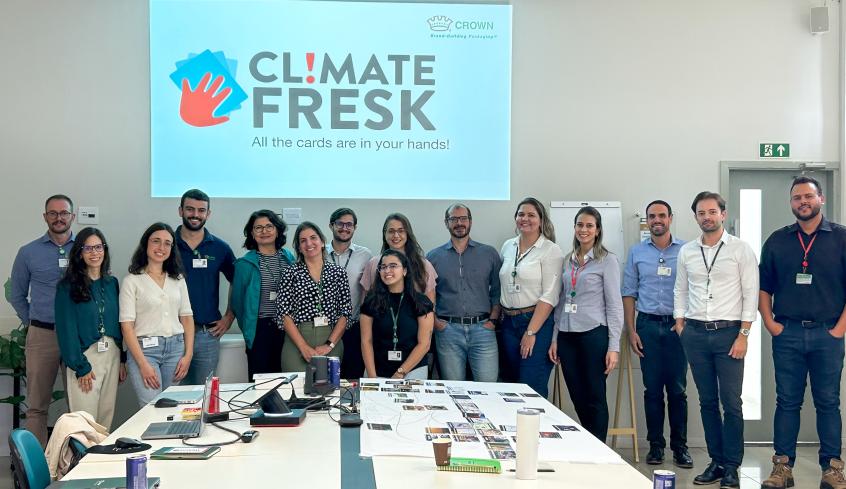International Day for Biodiversity

Today, 22nd May is the United Nations (UN) International Day for Biological Diversity, also known as “biodiversity.”
But what is biodiversity?
Biodiversity is commonly defined as the biological diversity of species including plants (flora), animals (fauna) and ecosystems.
Why is biodiversity important?
The latest WWF Living Planet Report (2022)1 highlights that global wildlife populations have plummeted by 69% on average since 1970—threatening the livelihood of our environments and diverse species--and confirms that biodiversity is at risk.
What is causing this crisis?
The 5 key drivers for biodiversity loss (UN, 2019)2, and some examples, include:
- Changes in land and sea use – deforestation and peatland drainage—especially to enable mono-crop agriculture
- Natural resource use and exploitation of organisms – over-fishing, unethical mining, unsustainable extraction of water
- Climate change – increases in extreme weather events leading to habitat destruction
- Pollution – marine plastic pollution and nitrogen run-off, especially from chemically fertilized agriculture
- Invasive species – introduced through global supply chains and human activity -- overtaking native species
Does this impact our industry? Why is it critical for Crown to protect biodiversity?
i) Nature is a part of our supply chain, regardless of whether we directly use natural resources. Businesses, and ultimately our way of life, are dependent on healthy ecosystems. A healthy, diverse ecosystem maintains soil and soil health to grow the food we need to eat; preserves water quality for us to safely drink; and filters and improves the quality of the air we need to breathe.
Crown makes packaging from aluminum and steel, mined from the abundant resources of bauxite and iron ore, to protect our customers’ beverages, food, and other products—products that ultimately come from plants and water. Without nature-provided resources, also known as “eco-systems services,” businesses including ours cannot continue to function effectively.
ii) A lack of biodiversity has significant monetary impacts – for example, the loss of insect and animal species diversity is not just a loss for their ecosystem, but a much larger domino effect. In fact, the loss of pollinator species alone will specifically threaten global crops with an annual market value of up to $577bn.3
iii) Biodiversity and nature is recognized as a powerful force to reduce CO2 equivalent emissions – it is estimated that by working with nature, emissions can be reduced by up to 11.7 gigatons of carbon dioxide equivalent per year by 20304, over 40% of what is needed to limit global warming.
How is Crown taking action for biodiversity?
a) Understanding any potential impacts on biodiversity: Crown has been mapping biodiversity in the vicinity of our plants using IBAT – Integrated Biodiversity Assessment Tool5 – starting with the aluminum beverage manufacturing facilities. We are also creating Biodiversity Risk Assessment, Mitigation, Management, and Action plans that have been audited to meet the Aluminium Stewardship Initiative (ASI) Biodiversity criteria for the ASI Performance Standard.
b) Raising awareness about biodiversity: Crown is offering training in our manufacturing sites (starting in Asia Pacific and the Americas) that supports employees to plant native trees and share information about biodiversity online. Raising awareness and fostering conversation around this topic is critical to improving engagement – as the existence of International Biodiversity Day demonstrates.
c) Partnering with local organizations in the vicinity of our plants: To meet water replenishment targets as part of Twentyby30 sustainability program, including Goal #9, we are teaming up with other parties on appropriate habitat preservation and creation. This support for local communities in turn supports biodiversity.
It is important we step up in these ways as almost 75% of the land-based environment and about 66% of marine environment has been significantly altered by human actions, but on average these trends have been much less severe or avoided in areas held or managed by indigenous peoples and local Indigenous peoples6 act as stewards for over 40% of intact ecosystems and protected areas, despite only representing 6% of the global population. Indigenous peoples managed lands have equal or higher levels of biodiversity in Brazil, Canada.7
Therefore, ensuring local partnerships are engaged with local and indigenous communities is critical to sustaining a biodiverse future that will help mitigate climate change, as well as support our businesses and human life.
For example, Crown’s ongoing water replenishment project in Brazil supports 3 years of work, through engaging with local farmers and communities, which will result in the protection of 100 hectares of forest in the Jundiaí Mirim Watershed, for each year of the project. It will also replenish almost half of the water consumed in our manufacturing plant in Cabreúva by the project completion date, and will offset 1,310 metric tons of CO2 equivalent per year.8
The biodiversity crisis is not unsolvable, but it needs attention now. Businesses have a role to play in long-term solutions. Crown is just at the start of an important journey to address biodiversity, alongside our ambitious and continuing Twentyby30 strategy to ultimately minimize our environmental footprint.
1https://wwflpr.awsassets.panda.org/downloads/lpr_2022_full_report_1.pdf
2https://www.un.org/sustainabledevelopment/blog/2019/05/nature-decline-unprecedented-report/
3IPBES, 2015 - Given that pollinator-dependent crops rely on animal pollination to varying degrees, it is estimated that 5-8 per cent of current global crop production, with an annual market value of $235 billion-$577 billion (in 2015, United States dollars1) worldwide, is directly attributable to animal pollination
4https://www.unep.org/facts-about-climate-emergency
5https://www.ibat-alliance.org/
6Intergovernmental Science-Policy Platform on Biodiversity and Ecosystem Services (IPBES) Media Release 2019 - Media Release: Nature’s Dangerous Decline ‘Unprecedented’; Species Extinction Rates ‘Accelerating’ | IPBES secretariat
8Page 42, Crown_2021-Sustainability-Report.pdf (crowncork.com)
Questions for Crown?
